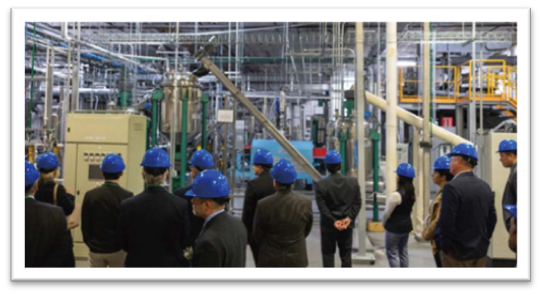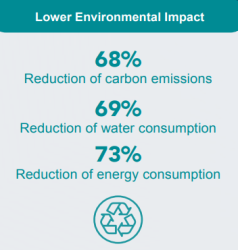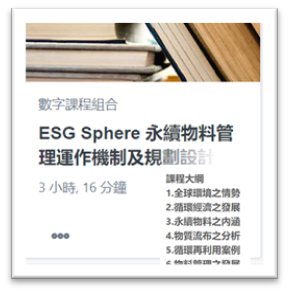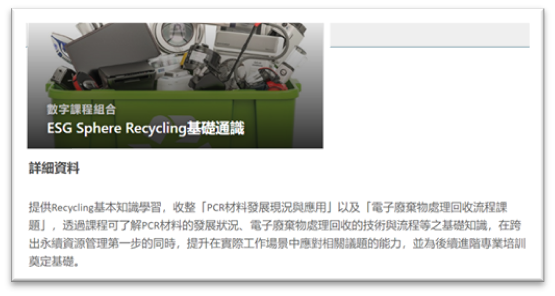Raw Materials Programs
Wistron develops and produces a diverse range of products. We have selected the high-revenue laptop computer products as our prioritized product line for the implementation of sustainable raw materials programs because the selection of materials for mechanical components is key to the design of laptop computers. Plastic and aluminum metal are the primary materials used for laptop casings, comprising approximately 74% and 11% of a laptop's weight, respectively. (Refer to Table 1.) Therefore, we have prioritized the adoption of sustainable materials for these two primary components.| Raw Material | Total Usage(ton) | Recycle Material Use Ratio(%) |
|---|---|---|
| Plastic | 3,977 | 17.8 |
| Aluminum | 576 | 14.9 |
| Steel/Iron | 1,503 | 0 |
| Copper | 237 | 0 |
| Cobalt | 0.01 | 0 |
| Nickel | 17.67 | 0 |
| Lithium | 0.64 | 0 |
| Titanium | 0.05 | 0 |
- Note: Usage of raw materials such as Cobalt, Nickel, Lithium, and Titanium have not been measured, but is estimated to be less than 1t per year
Minimizing the Environmental and Social Impact of Raw Materials
To mitigate the negative effects on the environment and society from using raw materials, Wistron is committed to integrating sustainability into our procurement management process. We have also established a traceability mechanism for materials. In accordance with the ISO 20400 Sustainable Procurement Guidance, we have developed a Sustainable Procurement Policy that includes guidelines on the use of sustainable materials. We require our supply chain partners to adhere to our Supplier Code of Conduct, which mandates that they assess the environmental impacts of their operations and upstream manufacturing processes. They are expected to minimize the negative effects on the community, environment, and natural resources, while also safeguarding public health and safety. Wistron assesses a supplier’s impact on sustainability in the following areas:- Environmental: environmental protection management (including sustainable materials management from mining to processing, pollution prevention, climate change mitigation and adaptation, biodiversity protection and natural habitats restoration, and ensuring compliance of upstream suppliers), carbon management/energy management, and management of water pipes and hazardous materials and waste.
- Social: human rights protection, labor security, and occupational safety and health management.
- Governance: sustainability and operational risk management, operational continuity and operational risk management; supply chain sustainability management (including business ethics), operational continuity and conflict minerals.
We carry out detailed evaluations of our primary plastic and aluminum suppliers for laptop computers, employing both written and on-site audits to examine the environmental and social practices of Tier 1 and non-Tier 1 raw material suppliers. When we identify issues with non-Tier 1 suppliers, we not only keep a close watch but also ask our Tier 1 suppliers to mentor these suppliers and demand ongoing improvements.
Goals and Partnerships for Sustainable Materials
To reduce the environmental impact of using virgin raw materials, Wistron collaborates with Weirun, a subsidiary that produces post-consumer recycled (PCR) plastics, to conduct analysis on the characteristics of PCR plastics and establish design standards. We take steps to introduce the use of sustainable materials/PCR plastics in selected products. Short, medium and long-term targets and progress will be formulated and disclosed to the public, including the ratio of products with sustainable/PCR materials in hardware revenues, the ratio of PCR plastic materials used in hardware products each year, etc.| 2023 Actions | 2023 Targets |
2023 Results |
Status | 2024 Actions | 2024 Targets |
2030 Targets |
2035 Targets |
|---|---|---|---|---|---|---|---|
| Sustainable materials utilized for the development of selected green products | PCR > 35% | 35.41% |
 |
Developing next-generation low-carbon NB products with increased proportions of sustainable materials. | PCR > 37% | PCR > 50% | PCR > 55% |
Implementation Goals for Sustainable and Recycled Materials
- Note: The target rate (%) is defined as the weight of PCR materials used/total product weight
Revenue ratio of hardware products PCR materials (%)
| Item | 2020 | 2021 | 2022 | 2023 |
|---|---|---|---|---|
| Laptops | 61.8 | 85.6 | 90.9 | 93.1 |
| Desktop Computers | 58.1 | 68.4 | 81.6 | 88.3 |
| LCD Monitors | 95.8 | 96.5 | 94.2 | 94.1 |
| Servers | 0 | 0.1 | 0.3 | 3.1 |
| Voice over Internet Protocol (VoIP) | 3.7 | 3.8 | 4.3 | 5.5 |
| Total | 58.7 | 79.1 | 80.3 | 84.5 |
- Note:Hardware products refer to laptop/desktop computers, and all-in-one (AIO) computers/ monitors/ servers/ Voice over Internet Protocol (VoIP)
In 2022, we established a pilot production line for the recycling and refining of lithium-ion battery cathode materials at Wistron GreenTech in the US. Our goal was to solve the environmental issues facing battery production and recycling processes worldwide. We expect to mitigate the negative environmental impacts by increasing the use of recycled materials and implementing recycling technology.


Training on Sustainable Materials
We are in the process of designing training courses to provide our employees with essential knowledge and skills for working with sustainable materials.Courses available:
- Sustainable Materials Management Systems and Planning: this course provides an overview of a range of topics, including the current global environmental issues, circular economy, sustainable materials management, and material distribution analysis, as well as case studies of recycling and reuse.
- Recycling Basics: this course offers basic knowledge on the current status and application of PCR materials as well as electronic waste treatment and recycling processes.
Courses currently in development:
- Introduction to PCR Materials Certification: this course covers PCR recycled materials, including their advantages and disadvantage, electronic product safety, UL yellow card related introduction, and flame-retardant testing and standards.



